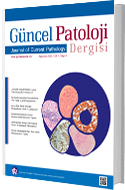2Prof. Dr.celal Ertuğ Etimesgut State Hospital, Department Of Ent, Ankara, Turkey
3Tuzla State Hospital, Department Of Ent, İstanbul, Turkey
Objectives: The larynx-related adverse effects that depend on cisplatin like laryngitis, laryngeal mucositis, laryngeal mucosal ulcer, and a loss of voice decrease patient comfort. Mechanisms regarding the emergence of mucosal injury have been suggested, and many antioxidants have been used to eliminate these side effects. We aimed to identify the laryngeal mucosal changes imposed by cisplatin and investigated whether antioxidants, and their healing effects on these changes, may help to reduce laryngeal complications in patients resulting from adverse effects in the larynx.
Materials and Methods: A rat model was designed to evaluate the effects of cisplatin on the larynx and the protective role of antioxidants. Single-dose cisplatin was given both intraperitoneally alone and additionally administered with p-coumaric acid, melatonin, resveratrol, vitamin D, and oleic acid over five days. Whole larynges were dissected and evaluated for edema, vascular dilatation, inflammation, cilia loss, and goblet cell distribution and scoring semi-quantitatively, both histologically and histochemically. Ki67, villin, Muc-2, and cyclooxygenase-2 were evaluated immunohistochemically.
Results: The most obvious effects of cisplatin were edema and reducing the number of ciliated cells. Cisplatin also increased vasodilatation and inflammatory infiltrate and reduced the Ki67 index and the number of the villin-positive and cyclooxygenase-2 stained cells.
Conclusions: The results of the study showed that resveratrol was the most preventive antioxidant agent against cisplatin-dependent mucosal changes. The highest increase in the Ki67 index was in the oleic acid group. Even though not statistically significant, all the antioxidants reduced edema and inflammation.
Anahtar Kelimeler : Antioxidants, cisplatin, melatonin, oleic acid, p-coumaric acid, resveratrol, vitamin D.

